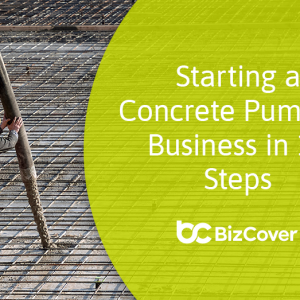Do you have the ability to lift heavy objects, mix concrete, and lay concrete? If so, then you may be considering a rewarding career as a concreter – provided you like getting a workout at work and enjoy getting your hands dirty from mixing and laying concrete.
Concreters use concrete bricks for building sturdy structures. Concreters use both manual and automated tools to smooth, level, and seal concrete surfaces.
While concreters do not need a formal concreting education, you can start your career in the concrete industry on the right foot by completing a contractor certificate, such as a Certificate III of Concreting through TAFE or another registered training organisation (RTO).
You can also complete a concreter apprenticeship or a traineeship with an employer in your local area.
So, let’s dig into how to become a concreter to help you decide if you want to be a concreter in Australia. This blog will explain all the essentials you need to know about becoming a concreter in Australia, including apprenticeships, traineeships, concreter insurance, qualifications and courses.
What do concreters do?
Qualified concreters are skilled workers who use automation and hand tools in order to build commercial and residential structures such as roads, bridges, pathways, and buildings.
Concreters are responsible for assembling building components, laying foundations, installing formwork, and concrete work. On any given working day concreters do many things. They may be tasked with delivering any of the following concrete solutions and jobs related to construction and building works:
- digging foundation trenches.
- mixing concrete on-site by combining gravel, cement, water, and sand.
- spread, tamp down, polish, cure, and seal concrete to be used for various structures and surfaces, such as floors, marine structures, roads, tunnels, and ramps.
- using power cutters to cut lines in concrete.
- using specialised machinery to create concrete surfaces in different shapes and textures, or to expose the aggregate.
- using concrete pumps to pour concrete, mix concrete, or direct concrete from the concrete truck.
- using trowels, paving machines, templates, and screeds to smooth and finish concrete surfaces.
- using cutting tools to cut joints in concrete.
- creating upright surfaces.
- installing steel reinforcements in concrete structures.
- installing concrete fixtures, such as door sills and anchor bolts.
- creating expansion joints, edges, or seams using a straightedge, edging tool, and jointer.
- taking the necessary steps to eliminate defects.
Skills for succeeding as a concreter
Concrete work is a physically demanding outdoor job, and employers are looking for individuals who are physically fit and hardworking, as well as those who can work independently and follow essential safety tips. You will also benefit from being well-versed in the materials, methods, and the machines and tools required to complete construction work.
Here are the key concrete skills and traits that will help you succeed in your concreter career:
- You enjoy working outdoors and doing practical, hands-on work.
- You are physically fit.
- You have in-depth knowledge of concrete characteristics.
- You understand basic math and can accurately read measurements.
- Precise hand-eye coordination.
- The ability to work both independently and as part of a team.
- An understanding of safety issues on construction sites.
- The ability to follow directions with diligence.
Qualifications for becoming a concreter
The entry-level requirements for becoming a concreter can vary from employer to employer. However, generally speaking you need at least a Year 10 education to become a concreter in Australia. You will also need to complete a Certificate III in Concreting at a TAFE or another RTO. You can also complete a traineeship or a concreter apprenticeship, or train under a registered building practitioner.
Once you complete your Certificate III, you will have the option to enrol in and complete a Certificate IV in Building and Construction (Building), which enables you is a supervised / contractor certificate that permits you to supervisor on construction sites
Workers in the construction industry, including concreters, are required to complete safety induction training in order to receive a Construction Induction Card. This card is a requirement to be accredited in Australia to enter a building site. Concreters working at heights must also complete a short course Work Safely at Heights course.
Five steps for becoming a concreter in Australia
Now that you know the concreter job description, lets dig into how to start your promising career as a concreter.
Step 1. Get your CIC card
In Australia, you must complete a safety induction and obtain a Construction Induction Card (also known as a CIC card) in order to work in construction.
All construction workers must hold a CIC card. This card is proof that you’ve received the training necessary to work safely at a construction site. This card is also required in order to enroll to take any concrete course.
Step 2. Enrol in and complete your concrete qualifications
While no formal qualification or tertiary education is required to begin your journey to becoming a concreter, you can gain valuable skills through onsite training in concrete.
Apprenticeships and vocational training can help strengthen your career prospects in the concrete industry. The most common course for getting a job in the concrete industry is a Certificate III in Concreting. This qualification provides fundamental knowledge on the following topics:
- Planning and organisation;
- Concrete placement;
- Understanding building plans and specifications;
- Concrete simple forms;
- Construction industry OHS policies, procedures and necessities;
- Communication in the workplace.,
The Certificate III in Concreting provides you with the experience and skills necessary to work as a concreter in commercial and residential construction projects. This course is available at TAFE and other RTOs.
Step 3. Enroll a concreting apprenticeship
Budding concreters may also enroll in apprenticeships and complete training on the job to become concrete contractors through construction companies or subcontractors. Contact associations such as the ABN Group and Australian Apprenticeship Pathways to learn more about concreting apprenticeships
Combining onsite training with formal programs is a great way to acquire concreting experience, and to develop the skills to become an independent concrete worker.
Step 4. Complete your Work Safely at Heights training
You may need to take a Working safely at Heights if your concreting job involves working in elevated sites or at heights.
This is a nationally accredited working at heights safety course that helps participants learn safety tips and build skills in choosing and implementing appropriate height safety equipment to perform specific tasks on job sites.
This course teaches students how to conform to Australian height-safety regulations as well as adhering to the relevant codes of practice. This qualification will help participants to understand the procedures for evaluating risks and obtaining work permits in order to perform concreting at elevated heights.
Fire and Safety Australia is one of the most reputable registered training organisations you can choose for completing your Work Safely at Heights training.
Step 5. Start your job search
Once you have finished your concrete qualifications, you are all ready to become a concrete contractor, and you can start applying for jobs in the concrete business.
Step 6. Reduce your exposure to risk
A career in concreting can expose you to many risks, which is why many concreters choose to reduce their exposure to risk with concreter insurance. Learn more about how BizCover and concreter insurance can help your new concreting business go the distance.
Reduce your exposure to concreter risk with BizCover
BizCover can help you get your concrete business started on the right foot by reducing your exposure to business risks. At BizCover we have helped more than 220,000 Australian small business owners reduce their exposure to risk BizCover, by making purchasing business insurance fast, easy, and cost-effective.
Call BizCover on 1300 920 868 to get concreter insurance coverage in just 10 minutes and get back to doing what you best.


